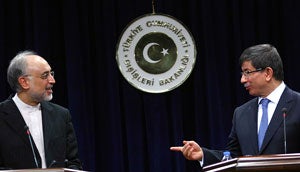Last Thursday, Iran and Turkey signed an agreement aimed at increasing trade between the two countries and doubling bilateral business by 2015. The agreement was inked by Iran’s Foreign Minister Ali Akbar Salehi and Turkish Minister of the Environment and Urban Planning Erdo?an Bayraktar following the 23rd session of the Joint Economic Cooperation Commission of the two countries.
This is an important signal to the United States and its allies: Ankara refuses to march to the Western drumbeat. It takes one step forward agreeing to deploy NATO missile defense, only to take a step back boosting Iranian trade.
Rapprochement between the two countries could not come at a worse time for the West, which is trying to convince Tehran to stop the military dimension of its nuclear program by using sanctions against Iran’s energy and financial sectors. The U.S. has approved a fresh set of sanctions targeting financial institutions that deal with Iran’s central bank to stem the flow of oil revenues. Washington has warned Turkey that banks that do business with their Iranian counterparts run the risk of being frozen out of the U.S. financial system.
Turkey has decided to openly oppose U.S. sanctions. Minister Bayraktar stated that “Iran is the world’s third biggest producer of oil, and the world’s second biggest producer of natural gas. The target is to make Turkey a bridge for the transfer of these resources.”
Iran’s foreign minister stated that trade volume between the two countries would increase to $30 billion by 2015, from about $15 billion last year—something Prime Minister Recep Tayyip Erdo?an and President Mahmoud Ahmadinejad proclaimed in the past. Yet Europe—the principal market for Iranian gas supplied via pipelines, which cross Turkey—is tightening sanctions and planning to stop buying Iranian oil.
This declaration of economic rapprochement comes at a time when political tensions between the two neighbors are still running high. A key point of disagreement is Iran’s continued support of the bloody regime of Bashar Assad in Syria, Iran’s closest ally.
Iran has gone so far as to send missile technology to Syria through Turkey, several truckloads of which have been intercepted by Turkish authorities in the past few weeks. Turkey has sided with the West on this issue, and has even announced it would support a NATO resolution for military action against the Syrian government—something Iran, Russia, and China are staunchly against.
Turkey and Iran also clashed when Ankara agreed to deploy NATO’s missile defense. An Iranian general threatened to target Turkish territory if the missile defense system is activated against his country. Despite Turkey’s attempts to assure Iran that the system is defensive, Iran wouldn’t have it.
Another point of unease in the Middle East over Turkish policies has been the future of its neighbor Iraq, a former Ottoman Empire territory. Ankara accuses the Iraqi government of “sectarianism,” as Ankara argues that a recent bid by Iraqi authorities to arrest Tariq al-Hashemi, Iraq’s Sunni vice president, on charges of running death squads is part of a clampdown on Sunni Arab politicians. This threatens to fan sectarian tensions and could push the country to splinter along ethnic lines. The Turkish viewpoint on the future of Iraqi politics does not sit well with the Iranian rulers, who back their Shi’a extremists in Baghdad as well as Hezbollah terrorists in Lebanon.
Yet, Ankara decided to reach out to Tehran. Rapprochement was in the works for an extended period of time before culminating in this agreement. In February of last year, at an event hosted by The Heritage Foundation entitled “The Turkish–Iranian Relationship: Too Close For Comfort?” experts addressed the concern that Turkey has diverged from U.S. interests on a broad set of important issues. Nowhere has this been more visible than vis-a-vis Iran.
Turkey is taking one step forward and two steps back in opposing Iran’s nuclear program. Despite the Obama Administration’s tight personal relationship with Erdogan, the U.S. should oppose Ankara’s undermining U.S.–Iran policy. If Turkish banks and businesses strengthen their partnership with Iran’s banking and state-owned firms that are complicit in proliferation, the U.S. should put its recently authorized sanctions to use.
Appeasement is not an option.
